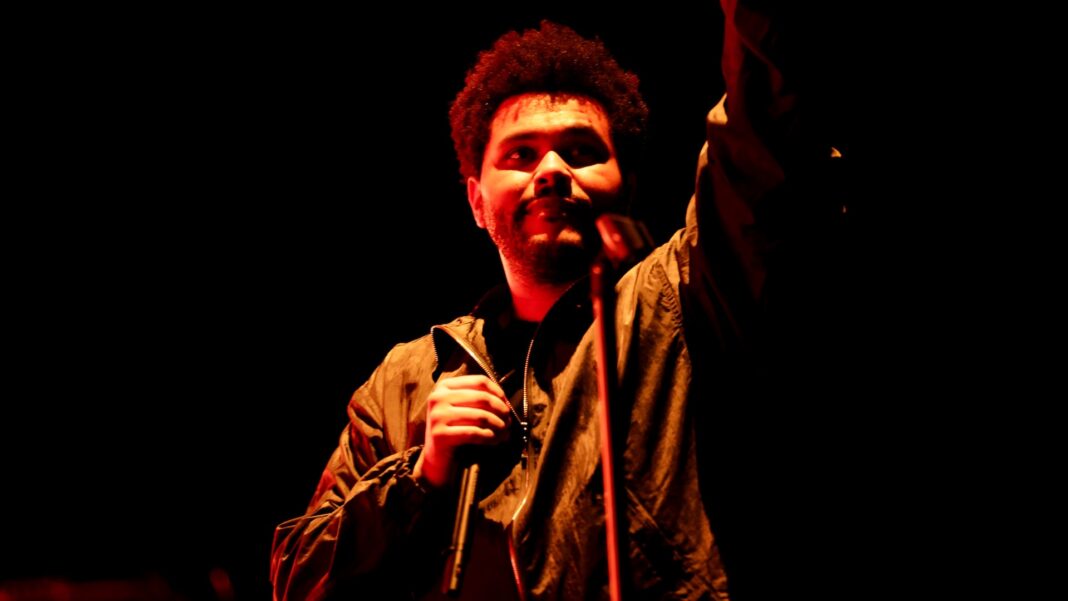The Weeknd Opens Up About Dealing With Sleep Paralysis – A Glimpse Into the Dark Night of His Soul In the world of entertainment, few artists have captivated audiences like The Weeknd. With his soulful voice, mesmerizing performances, and unapologetic style, he has become a cultural icon. However, behind the spotlight, The Weeknd has been grappling with a personal struggle that has kept him up at night – literally. Sleep paralysis, a condition that leaves victims trapped in a state of consciousness, unable to move or speak, has been a recurring nightmare for the singer. In a candid interview, The Weeknd opens up about his experiences with sleep paralysis, shedding light on a topic often shrouded in secrecy and stigma. Join us as we delve into the dark corners of his mind and explore the complexities of a condition that has left him questioning his own reality.
No Antagonists

The Weeknd explains how his personal experiences with sleep paralysis influenced his film Hurry Up Tomorrow, revealing the absence of traditional antagonists.
“There are no antagonists in this film,” he said. “I think that sleep paralysis is the enemy.” “That’s something I was really dealing with, still am to this day. Not as much as before but they’re very vivid nightmares where you’re in bed and you’re half asleep and you’re aware of your surroundings,” The Weeknd continued.
“But, you can’t move and you’re paralyzed for almost a minute and sometimes you see a shadowy figure in the corner and you hear a voice.”

Capturing the Fear
The Weeknd discusses how he aimed to capture the fear and anxiety of sleep paralysis on screen, making it a unique cinematic experience.
“I did my research on it and it’s just lack of sleep,” the singer explained. “Your brain is still awake when you’re asleep. My big medicine for it was to just turn your phone off, turn the TV off, turn all the lights off.”
A Soulful Experience
The film’s cast, including Jenna Ortega, shares their thoughts on the movie, highlighting its soulful and immersive quality.
“I haven’t seen a movie quite like it. It’s very soulful,” she said. “It feels more like an experience, and when you go into it with that mentality, it makes sense.”
Managing Stress and Sleep
Astronaut Naps
The Weeknd reveals his secret to managing stress levels, including his favorite 26-minute naps and the benefits of a consistent sleep routine.
“I’ve been fond of taking naps recently,” he said. “Astronaut naps. 26 minutes. Turn the whole world off. Turn all the lights off and put your alarm to 26 minutes exactly. No more or less. Works like magic.”
Sleep Paralysis and Stress
The Weeknd discusses the connection between sleep paralysis and stress, highlighting the importance of maintaining a healthy sleep schedule.
“It’s just lack of sleep,” the singer explained. “Your brain is still awake when you’re asleep. My big medicine for it was to just turn your phone off, turn the TV off, turn all the lights off.”
Practical Tips for Better Sleep
The Weeknd shares his practical advice for improving sleep quality, including turning off lights and electronic devices before bedtime.
“I’ve been fond of taking naps recently,” he said. “Astronaut naps. 26 minutes. Turn the whole world off. Turn all the lights off and put your alarm to 26 minutes exactly. No more or less. Works like magic.”
Conclusion
In the article, The Weeknd shared his personal struggles with sleep paralysis, an often-misunderstood condition that leaves individuals trapped in a state of frozen terror. The singer-songwriter revealed that he has been dealing with sleep paralysis for years, recounting the terrifying experiences he’s had and the emotional toll it took on him. He also spoke about the stigma surrounding the condition, emphasizing the importance of raising awareness and reducing the shame associated with mental health struggles.
The significance of The Weeknd’s openness about sleep paralysis lies in its ability to spark a much-needed conversation about mental health. By sharing his story, he is helping to break down the stigmas that often prevent people from seeking help and seeking to normalize the conversation around mental health. Moreover, his testimony serves as a reminder that even those who appear to have it all together can be struggling with their own demons. As we move forward, it is crucial that we continue to create a culture that encourages vulnerability and empathy, rather than silence and shame.
As The Weeknd’s story demonstrates, mental health is not a personal failing, but a human struggle that requires understanding and support. By continuing to share our stories and listening to those of others, we can build a community that is more compassionate and less judgmental. As The Weeknd so poignantly put it, “I think it’s really important to talk about mental health and to talk about your struggles, because it’s not something to be ashamed of.” By embracing this mindset, we can create a world where everyone feels empowered to speak their truth, free from the fear of being judged or stigmatized.
